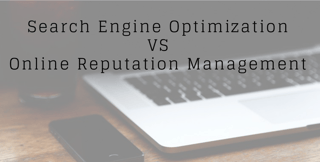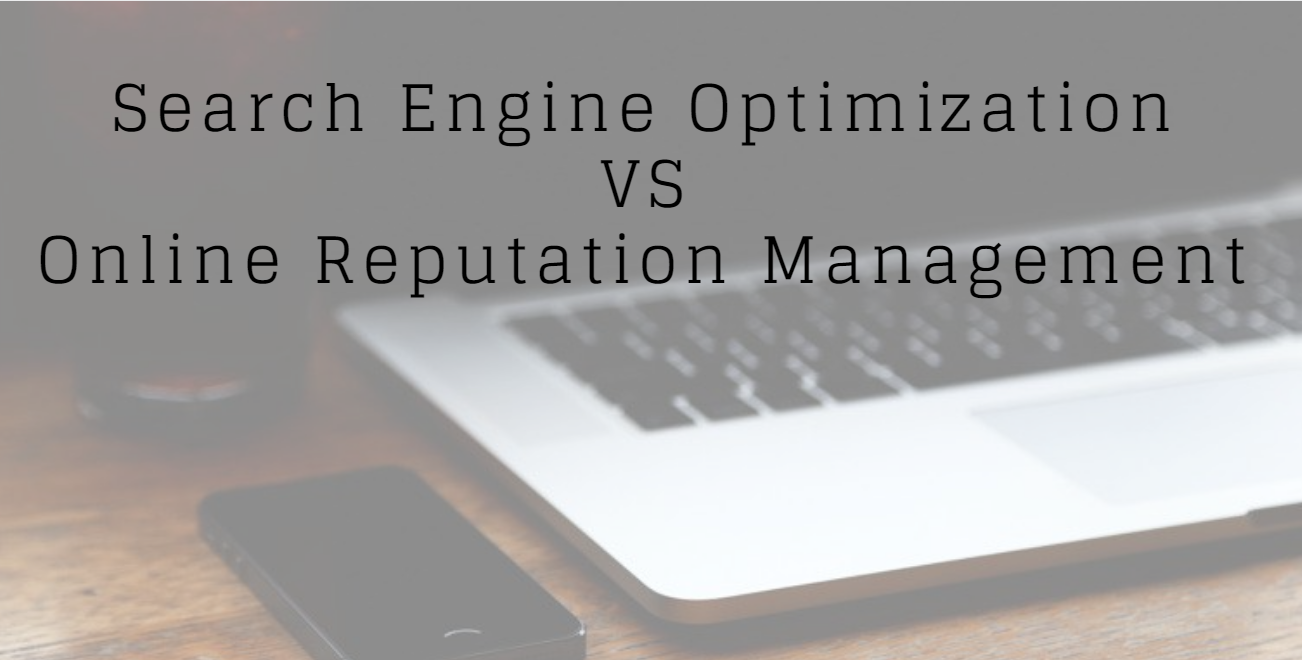Search Engine Optimization (SEO) versus Online Reputation Management (ORM)


In this day and age, search engine optimization (SEO) is a very important part of a digital marketing campaign, especially in the awareness stage. On top of that, it is very important to ensure that you have a solid online reputation management (ORM) strategy in place, particularly for the consideration and decision stage. Both of these concepts can go hand in hand and because of that people often wonder how they are different. Throughout this post, I will help you understand what these 2 aspects of digital marketing are, the differences between them, and how they work together.
What is Search Engine Optimization (SEO)?
Search Engine Optimization (SEO) increases the visibility of a website on search engines. When you see search engine results, they are ranked using an algorithm that takes many different things into account. Google has over 300 ranking factors they look at when placing a website in a particular position. SEO can result in a top search ranking for a single desired website or page.
To improve a website's SEO, it is important to focus on on-page and off-page techniques on an ongoing basis, especially since Google changes algorithms between 500 and 600 times per year. On-page factors include quality content, optimized site architecture, and improved HTML. Off-page factors include the creation of high quality backlinks and social sharing. These improvements can be made to a single web page or an entire website.
What is Online Reputation Management (ORM)?
Online Reputation Management (ORM) is very basic in its definition, but much broader in scope than SEO. ORM is exactly what the phrase suggests, managing your online reputation. This is one of the most dynamic activities online and one of the difficult too. It is one of the only activities where you have little or no control over different situations that can completely turn around any work you have previously invested into a campaign.
An outsider speaking about your brand, the brand's offline activity, and the actions on entities within the brand can all completely change the statistics of your campaign overnight, causing positive or negative mentions. With ORM, it is important to be prepared for anything and neutralize any negative content or mentions of your brand.
How Are They Different?
The main difference between SEO and ORM is that Search Engine Optimization is there to ensure people find your company online, while Online Reputation Management shapes people's opinion of your brand based on the information available online. Another way to help you remember is that SEO gets your foot in the door and noticed, while ORM gets people coming through the door once they have heard about you.
SEO is also very concerned with driving traffic to a company's website, whereas ORM manages content on many sites, including those not owned by the brand. For example, a huge part of Online Reputation Management is to monitor positive and negative reviews, like the ones on Google and Yelp, as well as obtain new ones.
How Are They Connected?
Although there are a couple of differences, these two aspects go hand in hand. Parts of SEO are used in the implementation of a good ORM strategy. Below are some of these strategies:
- Local listing creation are great for building links and allow users to leave reviews on them.
- Press Releases are also great for building links and help increase your brand awareness/
- Toxic link removal helps you avoid a penalty with Google and will also distance yourself from websites that are bad for your reputation.
- Brand monitoring is great for building links and monitoring what people are saying about you.
Therefore, in order to have a good online reputation, you must be executing an SEO strategy alongside it. A lot of Online Reputation Management companies do not do SEO, but this can cause many problems. Search Engine Optimization cements the search results, giving them longevity as well as better performance.
Online Reputation Management Techniques
I want to talk a little bit about the tactics that are used to execute a successful Online Reputation strategy. You will see that a lot of these tactics align with those used is SEO strategies:
- Local profiles are created to improve brand presence, as well as increase local rankings through optimization of those profiles.
- Review management includes monitoring negative, neutral, and positive reviews to see which aspects of your business need to be tended to. It also gives you a chance to address those issues by responding to any concerning reviews.
- Surveying allows you to get insight from your current customers to help improve your products and services.
- It is important to optimize the website not only for product and service keywords, but also for branded keywords.
- Press Releases allow you to build up your businesses brand through newsworthy content. It also gives you the added bonus of a link back to your website to help you SEO rankings.
- It is important to make sure the websites that are linking to you are relevant and authoritative. This not only shows that you have a successful brand, but it also avoids penalties in Google.
- There are many tools that allow you to monitor brand mentions. This allows you to address any reputation issues that may arise, but it also is a good opportunity for us to gain backlinks from people that mention you, but are not linking back to your website.
Now that you have read though this article, you can see that SEO and ORM have many differences, but are also very connected. In order to have a successful online reputation, you must have a good SEO strategy implemented. It is important to get people to your website through Search Engine Optimization and then ensure people keep coming back through other Online Reputation Management techniques.
